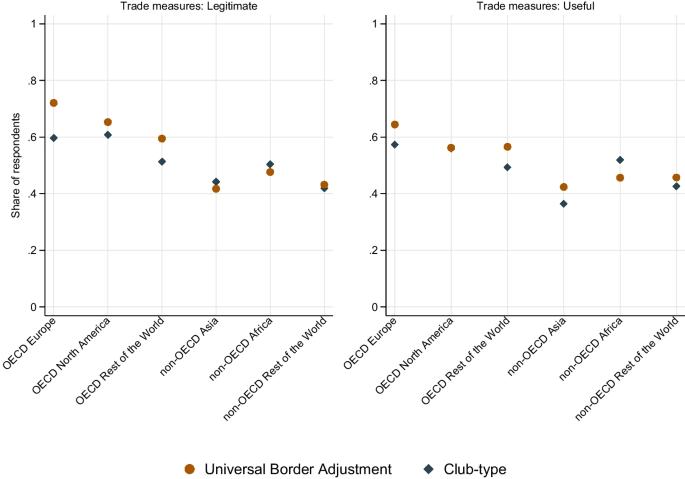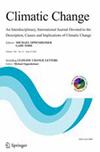决定将气候与贸易政策联系起来的意愿
IF 4.8
2区 环境科学与生态学
Q1 ENVIRONMENTAL SCIENCES
引用次数: 0
摘要
长期以来,分析人士一直主张将气候变化国际合作与边境关税等贸易措施联系起来,作为执行协议以实现更深层次合作的一种手段。然而,仍然难以评估决策者是否会允许这种联系,以及将气候和贸易联系起来是否实际上会对国际合作产生有益的影响。我们与大量在气候外交和政策方面经验丰富的气候专家合作,了解他们如何看待将贸易与气候联系起来的合法性和有效性,以及哪些因素可以解释这些观点。我们发现,来自富裕国家的专家,尤其是欧洲的专家,更有可能认为这种联系是合法和有效的。这些专家特别可能支持适用于所有国家的普遍边界调整(UBAs),以公平的经济竞争环境,而不是贸易措施,即定义一个排他的“俱乐部”国家,这些国家为减排做出额外的努力,同时惩罚非俱乐部成员。这一发现揭示了学术界对以俱乐部为基础的战略(包括使用边境措施进行执法的俱乐部)价值的思考转变与气候政策专家认为有价值的观点之间的紧张关系。欧洲专家尤其可能支持uba,他们也最不可能看到实施贸易措施的风险。总体而言,拥有高质量国家机构的国家认为,利用贸易措施加强气候变化合作的风险较低。一个特别有力的发现是,那些认为本国减排承诺雄心勃勃的专家更有可能看到使用贸易措施的风险。虽然这些国家可以从使用贸易措施中获益最多,但它们也是根据现有的《巴黎协定》提供最多的国家。专家们似乎越来越意识到,《巴黎协定》的自愿性与要求采取贸易措施的日益增长的政治压力之间存在不协调。我们还发现专家的属性,如培训和职业经验,可以影响他们的评估。在一些模型中,具有经济或商业背景的专家更倾向于支持贸易措施,而那些在自然科学、外交和国家政府工作的专家则不那么乐观。我们的研究结果表明,对以贸易为基础的执法必要性的不同看法是强有力的,与各国的重要属性(如其承诺)有关,并可能持续存在——这表明,有利于使用贸易措施的政策战略必须密切关注决定贸易措施在何处以及如何实施的条件。许多国家的专家是《巴黎协定》气候合作方式的最大支持者,他们也怀疑贸易措施的合法性。本文章由计算机程序翻译,如有差异,请以英文原文为准。

Determining the willingness to link climate and trade policy
Abstract Analysts have long advocated a linkage between international cooperation on climate change and trade measures, such as border tariffs, as a means of enforcing agreements to achieve deeper cooperation. Nevertheless, it has remained difficult to evaluate whether policy makers will allow such linkages and whether linking climate and trade would, in reality, yield beneficial effects to international cooperation. Working with a large sample of climate experts who are highly experienced in climate diplomacy and policy, we elicited how they view the legitimacy and usefulness of linking trade and climate and what factors can explain those views. We find that experts from richer countries, especially Europe, are more likely to see linkage as legitimate and effective. These experts are particularly likely to favor universal border adjustments (UBAs) that apply to all countries to level the economic playing field, rather than trade measures that define an exclusive “club” of countries making extra efforts to cut emissions while punishing non-club members. This finding reveals tensions between a shift in academic thinking about the value of club-based strategies—including clubs that use border measures for enforcement—and what climate policy experts see as valuable. European experts are particularly likely to favor UBAs and they are also least likely to see risks in implementing trade measures. In general, countries with high quality national institutions see lower risks in using trade measures to enforce greater cooperation on climate change. A particularly robust finding is that experts who perceive their home country’s emissions reduction pledge as ambitious are more likely to see risks from using trade measures. While these are the countries that could benefit the most from using trade measures, they are also the countries that are offering the most under the existing Paris Agreement. Experts seem to be increasingly aware of the dissonance between the voluntarism of the Paris Agreement and growing political pressures to apply trade measures. We also find the attributes of experts, such as training and career experience, can affect their assessments. In some models, experts with economic or business backgrounds are more likely to favor trade measures while those with careers in natural science, diplomacy, and national government are less sanguine. Our results suggest that diverging views on the need for trade-based enforcement are robust, associated with important attributes of countries such as their commitments, and likely to persist—suggesting that policy strategies favoring the use of trade measures must pay close attention to the conditions that will determine where and how trade measures can be implemented. Experts from many countries that are the biggest supporters of the Paris approach to climate cooperation also doubt the legitimacy of trade measures.
求助全文
通过发布文献求助,成功后即可免费获取论文全文。
去求助
来源期刊

Climatic Change
环境科学-环境科学
CiteScore
10.20
自引率
4.20%
发文量
180
审稿时长
7.5 months
期刊介绍:
Climatic Change is dedicated to the totality of the problem of climatic variability and change - its descriptions, causes, implications and interactions among these. The purpose of the journal is to provide a means of exchange among those working in different disciplines on problems related to climatic variations. This means that authors have an opportunity to communicate the essence of their studies to people in other climate-related disciplines and to interested non-disciplinarians, as well as to report on research in which the originality is in the combinations of (not necessarily original) work from several disciplines. The journal also includes vigorous editorial and book review sections.
 求助内容:
求助内容: 应助结果提醒方式:
应助结果提醒方式:


